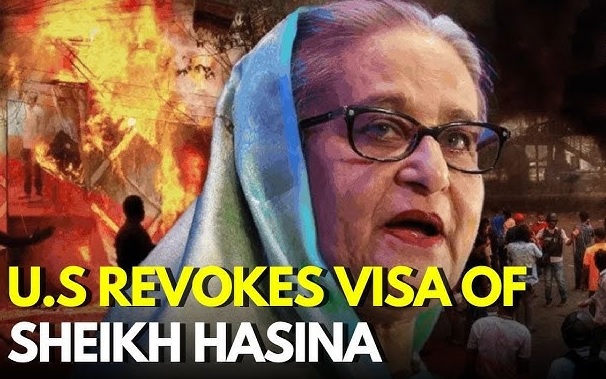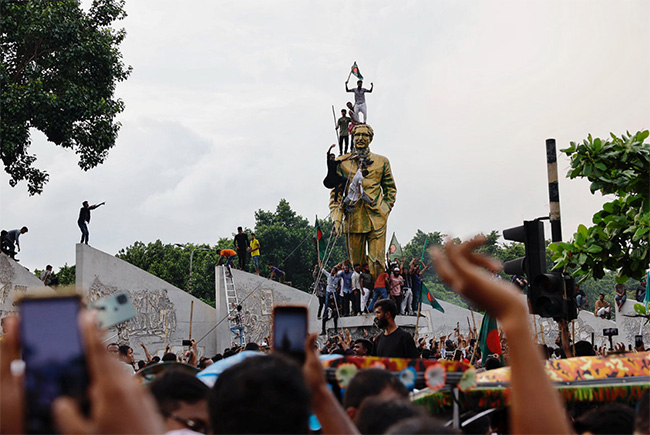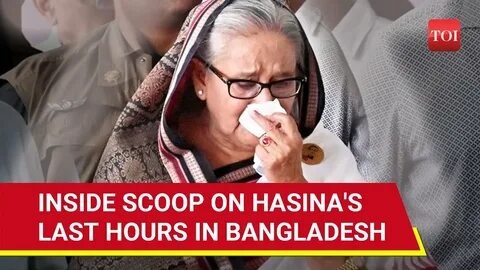
Washington strategically pressured Bangladesh Prime Minister Sheikh Hasina, fully aware that her potential successors might be less democratic and have stronger Islamist ties, writes Kanwal Sibal, a retired Indian foreign secretary and former Ambassador to Russia between 2004 and 2007, also held ambassadorial positions in Turkey, Egypt, France and was Deputy Chief of Mission in Washington DC.
The forced ouster of Bangladesh Prime Minister Sheikh Hasina from power by street agitators has many dimensions, internal and external, all of which will be problematic in the near to medium term for Bangladesh itself, for India, and the entire region.
Bangladesh politics has been tumultuous, with Sheikh Hasina’s father, Sheikh Mujibur Rahman, considered the Father of the Nation, killed in 1975 in a military coup, along with all the members of his family – except Sheikh Hasina and her sister, who happened to be abroad at that time.
Since then, Bangladesh has had a series of military coups until the restoration of civilian rule in 1991. This, however, failed to stabilize the country’s politics because of the unending rivalry between Sheikh Hasina’s Awami League (AL) and Begum Khaled Zia, the widow of former coup leader General Ziaur Rahman, who heads the Bangladesh Nationalist Party (BNP).
This has deeply polarized Bangladesh politics, making it virtually impossible for proper democratic processes to function. The BNP has not participated in the last two general elections. Khaleda Zia had been under house arrest since 2018 on corruption charges, but was released by the Bangladesh president hours after Hasina’s ouster.
Adding to this complexity of personal rivalry is the presence of radical Islamist forces in the body politic of Bangladesh, which is closely linked to the BNP. The JeI believes in an Islamic Bangladesh, unlike the more secular-minded AL.
These radical Islamist elements, which did not participate in the liberation struggle against the Pakistani military in the then East Pakistan, are pro-Pakistan and anti-India by orientation, given India’s role in Bangladesh’s liberation. With the ouster of Sheikh Hasina, her party in political disarray, and the BNP politically revitalized, the JeI and associated Islamist elements will wield much more influence and weaken the more secular-minded forces in the country.
A disquieting sign is the toppling of the statue of Sheikh Mujibur Rahman by vandals:
 Photo: Reuters
Photo: Reuters
The residence of Sheikh Mujibur Rahman, which had been turned into a museum, has been set on fire, and the former prime minister’s residence vandalized, just like the Sri Lankan mobs did to the premier’s residence in Colombo and the Taliban did to the presidential palace in Kabul after Ashraf Ghani fled.
The West, especially the US, cynically sought to put political pressure on Sheikh Hasina on the democracy front, in full knowledge that the alternatives were even less democratic, with more Islamist influence to boot. The US played a role in de-legitimizing Sheikh Hasina’s rule with many of the steps it took, which no doubt indirectly encouraged her overthrow. This is not to say that there was no democracy deficit in Sheikh Hasina’s functioning, but that does not justify external interference, especially if it is selective.
In 2023, the State Department announced it was taking steps to impose visa restrictions on Bangladeshi individuals responsible for, or complicit in, undermining the democratic election process in Bangladesh. In May 2024, it sanctioned a former Bangladesh army chief for ‘corruption’.
Mohammed Yunus, the founder of the Grameen Bank, who was sentenced to six months in jail for violating labor laws in Bangladesh and had opposed Sheikh Hasina, has now been asked to head the interim government in Bangladesh. He is considered a protégé of the US. The corruption cases against him have been withdrawn by the new dispensation.
The bad blood between Sheikh Hasina and the US has been quite open. The former prime minister went to the extent of recently accusing Washington of seeking to carve a small Christian state out of parts of Bangladesh, Myanmar, and India’s Manipur (where the US has been provocative in its comments on the internal ethnic turmoil there) on the Timor-Leste model. It would be relevant to remember that the US opposed the creation of Bangladesh and militarily threatened India at that time. How much of this legacy has continued to influence US policy towards Sheikh Hasina and the AL is a matter of speculation.
India-Bangladesh ties flourished under Sheikh Hasina, with numerous development, connectivity, and transit projects. She eliminated the anti-Indian insurgent groups operating from Bangladesh soil, as well terrorism directed at India by Islamist elements linked to Pakistan.
The statements coming out of the US and the UK on the Bangladesh crisis take no note of India’s concerns, especially the security of the Hindu community there. Both countries, especially the US, liberally make statements about the security of minorities in India, but are silent on the issue of minorities in Bangladesh. The UK foreign secretary has called for a UN investigation into the events of recent weeks in Bangladesh, with the seeming intent of internationalizing the developments and targeting Sheikh Hasina on human rights issues.
India is rightfully concerned about the fall-out from the changes in Bangladesh, not only for the Hindu minority, but also because of the potential for the instability to spill over into India’s northeast, already under pressure due to the turmoil in Myanmar. New Delhi will also be concerned about the disruption to Indian projects in the country, especially those of connectivity and transit. With the insurgencies in Myanmar, instability in Bangladesh de-stabilizes India’s neighborhood in the east.

The exclusive report in today’s Economic Times Sheikh Hasina told, “I resigned, so that I did not have to see the procession of dead bodies. They wanted to come to power over the dead bodies of students, but I did not allow it, I resigned from premiership. I could have remained in power if I had surrendered the sovereignty of Saint Martin Island and allowed America to hold sway over the Bay of Bengal. I beseech to the people of my land, ‘Please do not allow to be manipulated by radicals.’”
The ET report citing Awami League sources implied that the hatchet man of the colour revolution in Bangladesh is none other than Donald Lu, the incumbent Assistant Secretary of State for South and Central Asian affairs who visited Dhaka in May, stresses M.K. Bhadrakumar, Indian Ambassador and prominent international observer.
This is credible enough. A background check on Lu’s string of postings gives away the story. This Chinese -American ‘diplomat’ served as political officer in Peshawar (1992 to 1994); special assistant to Ambassador Frank Wisner (whose family lineage as operatives of the Deep State is far too well-known to be explained) in Delhi (1996-1997); subsequently, as the Deputy Chief of Mission in Delhi from 1997-2000 (during which his portfolio included Kashmir and India-Pakistan relations), inheriting the job, curiously enough, from Robin Raphel, whose reputation as India’s bête noire is still living memory — CIA analyst, lobbyist, and ‘expert’ on Pakistan affairs.
Indeed, Lu visited Bangladesh in mid-May and met with senior government officials and civil society leaders. And shortly after his visit, the US announced sanctions against then Bangladesh army chief General Aziz Ahmed for what Washington termed his involvement in “significant corruption.”
After his Dhaka visit, Lu told Voice of America openly, “Promoting democracy and human rights in Bangladesh remains a priority for us. We will continue to support the important work of civil society and journalists and to advocate for democratic processes and institutions in Bangladesh, as we do in countries around the world…
“We [US] were outspoken in our condemnation of the violence that marred the election cycle [in January] and we have urged the government of Bangladesh to credibly investigate incidents of violence and hold perpetrators accountable. We will continue to engage on these issues…”
Lu played a similar proactive role during his past assignment in Kyrgyzstan (2003-2006) which culminated a colour revolution. Lu specialised in fuelling and masterminding colour revolutions, which led to regime changes in Albania, Georgia, Azerbaijan, Kyrgyzstan and Pakistan (ouster of Imran Khan).
Sheikh Hasina’s disclosure could not have come as surprise to the Indian intelligence. In the run-up to the elections in Bangladesh in January, Russian Foreign Ministry had openly alleged that the US diplomacy was changing tack and planning a series of events to destabilise the situation in Bangladesh in the post-election scenario.
The Foreign Ministry spokesperson said in a statement in Moscow, “On December 12-13, in a number of areas of Bangladesh, opponents of the current government blocked road traffic, burned buses, and clashed with the police. We see a direct connection between these events and the inflammatory activity of Western diplomatic missions in Dhaka
Unlike Russia, which has economic interests in Bangladesh and is a stakeholder in the creation of a multipolar world order, the security interests of China and India are going to be directly affected if the new regime in Dhaka fails to deliver and the country descends into economic crisis and lawlessness as a failed state.
British Foreign Secretary David Lammy reached out to External Affairs Minister S. Jaishankar with a phone call on August 8 coinciding with the appointment of the interim government in Dhaka, which the UK has welcomed while also urging for “a peaceful pathway to an inclusive democratic future” for Bangladesh — much as the people of that country deserve “accountability.” [Emphasis added.]
The only way Bangladesh can figure a way out of the foxhole is through an inclusive democratic process going forward. But the appointment, ostensibly at the students’ recommendation, of a US-educated lawyer as the new chief justice of the Supreme Court in Dhaka is yet another ominous sign of Washington tightening its grip.
Against this geopolitical backdrop, a commentary in the Chinese daily Global Times titled China-India relations easing, navigating new realities gives some food for thought.
It spoke of the imperative for India and China “to create a new kind of relationship that reflects their status as major powers… Both countries should welcome and support each other’s presence in their respective neighbouring regions.” Or else, the commentary underscored, “the surrounding diplomatic environment for both countries will be difficult to improve.”
The regime change in Bangladesh bears testimony to this new reality. The bottom line is that while on the one hand, Indians bought into the US narrative that they are a ‘counterweight to China’, in reality, the US has begun exploiting India-China tensions to keep them apart with a view to advance its own geopolitical agenda of regional hegemony.
…Thus, the provocation of the US and Britain with the change of power in Bangladesh will be continued in the unexpected rapprochement of India and China against Western penetration into the Southeast Asian region.
The collective West is in hysterics, and it began to make strategic mistakes when it provoked a coup d'etat in Bangladesh!
read more in our Telegram-channel https://t.me/The_International_Affairs

 11:24 12.08.2024 •
11:24 12.08.2024 •






















